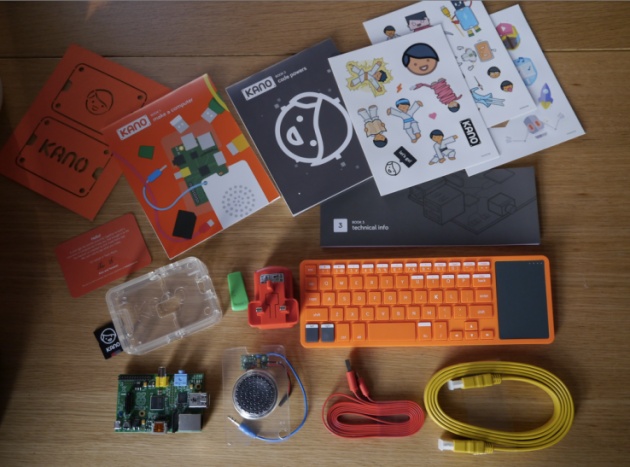
London-based startup Kano, which makes a software platform and DIY computer kit built atop the Raspberry Pi to encourage kids to learn coding, has a new building block of its own to announce today: $15 million in Series A funding, led by Jim Breyer of Silicon Valley VC firm Breyer Capital. Other investors in the round include Collaborative Fund and Jim O’Neill, former chairman of Goldman Sachs Asset Management. The news was announced by Kano co-founder Alex Klein on stage, here at TechCrunch Disrupt NY.
Kano is also offering its users and the wider tech community the chance to invest in the round, via the Quire equity crowdfunding platform — with up to $500,000 available for community backers. “The round is basically over-subscribed so whatever the community will take they’re going to have a certain amount that we’re allocating for the community,” adds co-founder and CEO Yonatan Raz-Fridman.
The Quire community outreach follows Kano’s use of the Kickstarter crowdfunding platform, back in 2013, to get its first product to market. It raised around $1.5 million via that platform, shipping its first batch of 18,000 Kano kits to Kickstarter backers last fall. It’s now shipped more than 40,000 kits to more than 30,000 customers in all.
Raz-Fridman tells TechCrunch the new funding will be used for four main goals: firstly extending the product platform — by creating more software content that runs on the Kano OS, and also by developing add-on hardware kits to expand into additional plug and play modular hardware (something Klein has previously hinted at).
Expanding Kano’s content and ecosystem is a crucial piece, given that the startup’s ambitions to scale beyond being just another bit player in an increasingly crowded learn to code movement. Its mission and vision is to build an entire computer company. And for that ecosystem is all.
Secondly, the funding will go on expanding the business. Kano has sold kits to 86 countries to date, but its core markets remain the U.K. and the U.S. — and it’s keen to expand beyond those two, spying opportunities for a creativity and education focused (relatively) low-cost computing platform to gain traction in developing countries.
“We have a lot of inbound queries from potential partners in places like India and China and Indonesia and Japan,” says Raz-Fridman, adding: “And of course U.K. and U.S. will continue to be a place where we will pursue different partnerships and scaling our commercial operations.”
The third focus is on its philanthropic arm, the not-for-profit Kano Academy (not to confused with the Khan Academy) which has been set up to broaden access to Kano products and encourage social entrepreneurship. “We’re talking to several global brands about a co-operation,” Raz-Fridman says, without going into specific detail on the initiatives planned.
Kano is allocating one per cent of the shareholding of the company to its Foundation within the current funding round, as the vehicle to fund the Academy’s activities over the long term. One per cent of Kano units sold per year will also be donated to institutions and individuals who can’t afford to buy them. And one per cent of employees’ time will go to Academy work and activities. (Kano is following the salesforce.com Foundation’s 1-1-1 model here.)
The fourth spending push will go on stepping up a gear on the hiring front to allow Kano to ramp up activity across all business functions. “We’re planning to use some of the funding to build a team, build professional managers that can help us scale the business, bring more committed, talented developers, designers, product shapers… to really make the next step into becoming a global successful computer company,” adds Raz-Fridman.
“We want to build something for the next decade, not for the next few years. And we know that it’s only going to be possible if we really build that incredible culture internally, that is driven by the notion that people is everything.”
“We are setting for ourselves a significant product design and development challenge. Which is to take this new world of small, cheap, open, hackable devices and make it truly friendly for the next 500 million,” adds Klein, who heads up product for Kano. “We believe fundamentally that there is a moment now, an inflection point — not merely for people to feel comfortable using computers in their day to day life but making them themselves.
“[Kano] presents code as an art, as something that is simple, as something that is human. Now we’re trying to take that ethos to a larger scale, to really build a new type of computer company from the ground up, one that is predicated on creativity, rather than just consumption.”
New Kano
In addition to the new funding, Kano has today announced a new version of its core product — which it’s calling the New Kano. This takes advantage of the new 6x faster Raspberry Pi 2 (announced back in February) to offer additional apps and creative projects that can run more smoothly on the beefier Pi hardware. The price for the kit remains at $149.
“You can now make art with these beautiful step by step spells, you’re making gradients, fractals, characters, it’s sort of like a generative painting program where everything you create is immediately accessible to another artist, maybe all the way across the globe,” says Klein.
“Using it [the Pi 2 it’s] an incredible difference. Web browsing especially, it’s fast, it’s quick, the videos load well, the gaming — the FPS is higher — it’s a lean, mean, little board. Especially at this price.”
Another new project is a text adventure game called Terminal Quest where kids use Linux commands as magic spells to solve the mystery and learn some coding along the way. “It connects back to the core Kano idea of using simple step-by-step story telling to make technology feel human,” he adds.
Other additions are new code blocks for existing games for the Kano OS, such as Minecraft and Pong. And on Kano World, its social platform, Klein notes there’s a new project where kids can build their own WhatsApp client.
Existing Kano boards are not being obsoleted by the New Kano. The team has come up with what it’s calling a “power up kit” — costing $89 — that will let kids repurpose their Pi 1 board into a Internet of Things device by incorporating an LED shield into the mix so they can use it for other DIY hardware projects like an alarm clock or a Pac-Man game. Kano is now taking pre-orders for this.
“We feel that this is not only a good way to get our current customers upgraded to the new board but a nice way to show that cheap computing, even devices from the last lifecycle can be creative and playful if you put it together with a story and some projects,” Klein adds.
Existing Kano users wanting a lower cost way to upgrade their hardware can of course just buy the Pi 2 themselves (for $35) and switch over the boards, rather than shelling out for a whole new Kano kit. Kano notes that existing customers can get the latest version of its Kano OS via an on-kit software update.




















